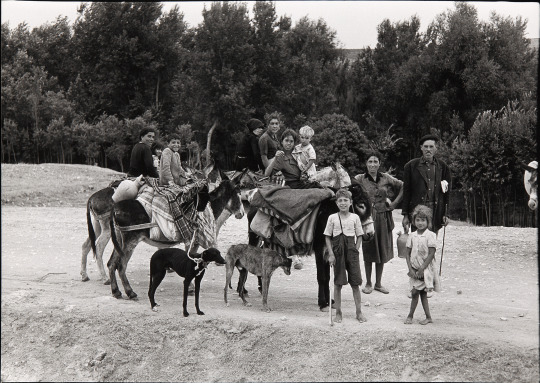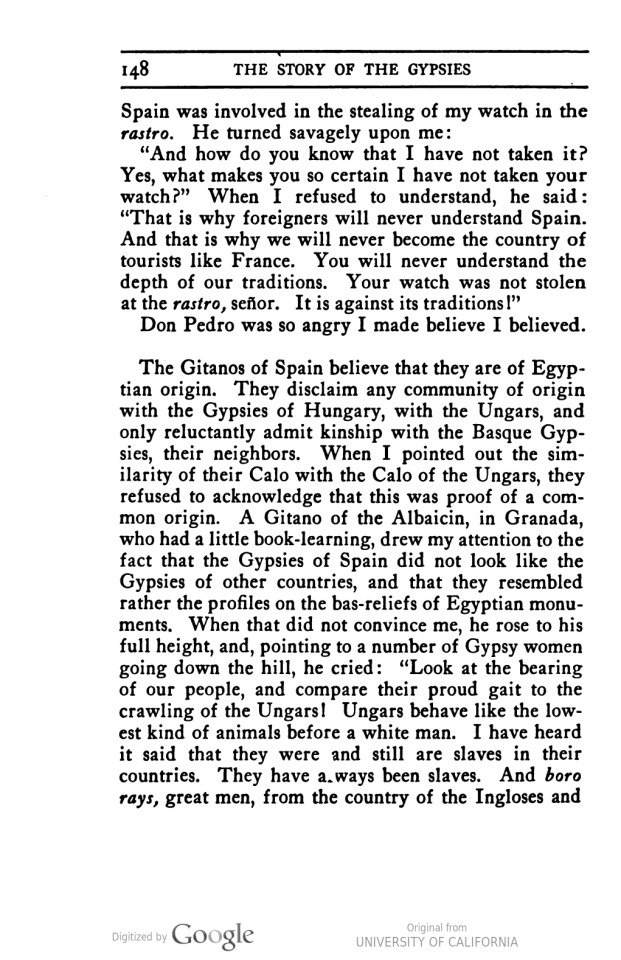#Gitanos
Explore tagged Tumblr posts
Text
¿Pero qué fantasía es esta?
Enviado por: Nagras
31 notes
·
View notes
Text

Familia nómada de gitanos. La Mancha, España. 1960
Foto: Oriol Maspons
34 notes
·
View notes
Photo

Cristina Garcia Rodero. Noche de los favores, Alosno (Huelva), 1991.
#Cristina Garcia Rodero#Magnum#magnum photos#gypsy#romería#spain#costumbrismo#flamenco#gitanos#photography#etnography#spanish photographers
165 notes
·
View notes
Link
Los gitanos son históricos pic.twitter.com/TYmuyOBKo5
— Tage (@Tagelca) October 26, 2024
Cómo que Felipe vi.
1 note
·
View note
Text
FanArt - Laprincesadelosgitanos
Después de haber dibujado a Yui Komori con el vestido flamenco sevillano de Miss Acacia, quise dibujarla como una gitana rumana o romaní. Cómo los vampiros descienden de Rumanía, me sentí otra vez OBLIGADA POR MI MISMA XD dibujar a Yui como gitana, inspirado me en muchos personajes para su atuendo, obviamente de Esmeralda del libro "Nuestra señora de París" o "El jorobado de Notre Dame" y la princesa de los gitanos Anna Valerious de "Van Helsing" . . . After having drawn Yui Komori in Miss Acacia's Sevillian flamenco dress, I wanted to draw her as a Romanian or Romani gypsy. How vampires descend from Romania, I felt FORCED BY MYSELF again XD to draw Yui as a gypsy, I was inspired by many characters for her outfit, obviously Esmeralda from the book "Notre Dame of Paris" or "The Hunchback of Notre Dame" and the gypsy princess Anna Valerious from "Van Helsing"









#gipsy#gitana#notredamedeparis#rejet#vampire#vanhelsing#gitanos#esmeraldadisney#diaboliklovers#yuikomori#esmeraldathehunchbackofnotredame#diabolikloversmoreblood#diabolikloversyui#diabolikloversyuikomori#vanhelsingannavalerious#notredamedeparisesmeralda#REJET#anime
2 notes
·
View notes
Text

The story of the Gypsies / by Konrad Bercovici ; illustrated by Charlotte Lederer.
3 notes
·
View notes
Photo

Carmen, de Prosper Mérimée (1847)
#Mérimée#novela corta#amor#celos#Andalucía#gitanos#violencia#folclore#estereotipos#manipulación#culpa#literatura francesa#Alianza Editorial
4 notes
·
View notes
Text
El Papa a los gitanos: Caminen juntos y anuncien la ternura de Dios
Comunicado de http://www.vaticannews.va — El Santo Padre dirige una sentida carta al pueblo gitano en España, con motivo del sexto centenario de su llegada al país: “Tienen mucho que aportar a la Iglesia y a la sociedad”. El Santo Padre propone formar comunidades de discípulos misioneros que se involucren, acompañen y celebren y ser peregrinos de esperanza. Sebastián Sansón Ferrari – Ciudad del…

View On WordPress
0 notes
Text
«Gitana (Homenaje de admiración a García Lorca)», de José Luis Hidalgo
La producción poética de José Luis Hidalgo (Torres, Cantabria, 1919-Madrid, 1947), que además de poeta fue pintor, se adscribe el grupo de la poesía existencial española de posguerra y la denominada «Quinta del 42». Fallecido a temprana edad, solo alcanzó a publicar tres poemarios: Raíz (1944), Los animales (1945) y, su obra cumbre, Los muertos (1947), poemario de gran intensidad lírica y…

View On WordPress
#Federico GarcíaLorca#Gitana (Homenaje de admiración a García Lorca)#Gitanos#Gitanos en la literatura#Harapos rojos y verdes#José Luis Hidalgo#Julio Romero de Torres#La chiquita piconera#Literatura española#Literatura española del siglo XX#Poesía española del siglo XX#Preciosa#Pseudopoesías#Quinta del 42
1 note
·
View note
Text
Lo de los gitanos con TikTok es otro rollo:
17 notes
·
View notes
Text

The Great Gypsy Round-Up: A Tragic Chapter in Spanish History 1749-2024 275th anniversary
The Great Gypsy Round-up (Gran Redada de Gitanos), also known as the general imprisonment of the Gypsies (prisión general de gitanos), stands as a haunting reminder of the cruelty inflicted upon the Roma people by the Spanish Monarchy. On 30 July 1749, under the orders of King Ferdinand VI and orchestrated by the Marquis of Ensenada, a coordinated raid swept across Spain, leading to the arrest and brutal genocide of 12,000 Romani souls. While some were freed after a few months, countless others endured years of harsh imprisonment and forced labor.
This atrocity didn’t happen in isolation. Since a royal edict by Charles II in 1695, Spanish Romani had been cruelly confined to certain towns. A further edict in 1717 tightened the noose, restricting them to just 75 towns and districts, ensuring they could never gather in significant numbers.
Nicolás Jiménez González poignantly highlights the horror of the 1749 Round-Up, calling it the oldest-known attempted genocide against the Roma in Spanish territories. At the time, the language of “genocide” didn’t exist; instead, the term “extermination” was used. Yet the authorities’ intent was clear: by imprisoning Roma men and women separately, they aimed to wipe out the Roma lineage by making it impossible for a new generation to be born. From today’s perspective, this heart-wrenching act meets the very definition of genocide, marking one of the darkest stains on Spain’s history.
This month marks the 275th anniversary of this tragic event. To honor the memory of those who suffered, Union Romani Spain is organizing a commemoration in Madrid. This gathering will serve not only as a remembrance of the past but also as a call for justice and recognition of the suffering endured by the Roma people.
0 notes
Text
Es un viaje a otra dimensión 1ª parte, es real, existe. Y ellos también votan.
5 notes
·
View notes
Text
Los Dragomir
Por Noelia Albretch En el norte no abundan los locales de venta de lanchas, ni los astilleros y creo que la ausencia de esta particular industria no se debe, precisamente, a la falta de agua. Más allá de la delgadez de los ríos cuando la calle se transforma en un cauce natural por donde deambulan líquidos putrefactos es necesario recurrir a otros medios de transporte. Entonces, se visita el…

View On WordPress
0 notes
Text

Okay, I will try to explain this topic as well as I can. I will preface this with the fact this comes from personal experiences, and that they may not apply for everyone who has ties to this culture, but let's get to it:
What's the issue with Fortune tellers / "Exotic" circus performers, sexualized belly dancers and other forms of orientalism/Romani depictions?
So, as someone in the TTRPG world (specifically, the DnD community), this sort of trope is seen quite a lot. From the portrayal of Vistani (which has been tried to be fixed, but not... too well), to player characters in home games, as well as popular canon characters and podcasts, it's got quite normalized. Most of these tropes are based on Romani, which is a widespread ethnicity present all across the globe. Now, it feels almost strange to call it orientalism, given how Romani have been in Europe since the Middle Ages, even though they do have roots outside of Europe.
Romani face one of the biggest diaspora in the world: You will find Roma people under many names in very different countries, with cultures and traditions that can clash heavily. Their numbers can range from few hundred in some countries, to over a million in those they have a biggest presence. My own experience is tied to Spanish Roma, known as Gitanos, which is where my mother's side family comes from.
Gitanos are a widespread group, although they're most numerous in the southern part of Spain, Andalusia, where their presence has shaped the culture. Flamenco is thought to have been born from Gitano culture, and it has been adopted as a staple of the Andalusian identity, and the whole of Spain. Gitanos are hard to understand as their own ethnicity in Spain: There's been centuries of Gitanos and Spanish people mixing, and the average Andalusian is quite tan to start with (given Muslim presence there has also been pretty firm). It means it can be hard to "clock" a Spanish Romani person from a non-Romani one. It means you can find Romani people most would consider white, at least by Spanish standards. Most of the discrimination Gitanos face is cultural (and the whole ordeal can be a bit harder to explain from a more US-centric view).
Now, even when Gitanos have influenced Spanish culture a lot, they still face plenty of discrimination. They are one of the most marginalized groups out there. Laws have discriminated against them for centuries, on and off, which have put them in poverty. And poverty often develops into criminality, which has only seeded the idea that Gitanos are criminals, "lowlies", the bottom of society, "uncivilized", etc. Now, here comes a bit of my own experience with this.
My entire family is Andalusian, but both sides moved from there (the south) to Catalonia (north-east) in order to find a job during the Francoist (fascist) dictatorship. I won't get much into the specifics of the Catalan vs Andalusian beef because that's a bit of a massive topic too, but the important thing here is: My mother's side is Romani. My grandma faced some horrifying forms of discrimination, including the theft of her first child during the fascist dictatorship, which was taken from her by nuns (who ran hospitals at the time) to be placed into a "proper" family. (This is something that happened repeatedly at some hospitals during these times).
Now, she had two other children: My mother and my aunt. My aunt remained closely knit to Romani culture, and took part in it, which included marrying a Romani guy. She always did her best efforts to be part of it. I know she was into some culturally-related dances, which included some forms of bellydancing (which is also partially tied to Roma culture). But my mother decided she'd rather cut ties with her culture and become "civilised", by abandoning said culture.
This isn't too uncommon for Gitanos, to be honest. I've met a few people who come from similar backgrounds through my life. One of them was in university, where a fellow classmate gave an oral exposition about how his family had done a great job at "becoming civilised" by cutting ties with their own Roma roots. My university was a fairly progressive space, but no one batted an eye at that: The sheer hatred of Roma culture runs so deep even people who normally abhor racism and xenophobia consider Gitanos to be worth the hate.
There's a social pressure to do that, too. Everyone "knows" Gitano are criminals. I can't really even begin to explain how deeply does this sort of discrimination run. Roma are amongst the most hated minority groups in all of Europe (as well as most of the world). You will find that even in very leftist circles. People will try to erase the fact Roma have their own culture, and just make the world equal to "criminal", call them gy***** (which is a slur, btw), and detach them from being an actual culturally (and often racially) distinct group.
Now, this is only empowered by how media has taken our culture (it is almost hard for me to call it "our", given how much my mother ensured to take that away) and made it into a bad trope. Growing up, I was told my aunt was a sexual deviant who partook in indecent dances. Bellydancing is often seen as something very sexual (Wasn't, in origin), very unfitting. In media, bellydancers veer on the side of being a f*tish, and the common trope is the "bellydancer who seduces people in power for their own benefit". There's also the whole idea of shady fortune tellers and other magical tropes, that sort of weird mysticism that falls rapidly into orientalism. The idea that Roma will hex you, curse you, place an "Evil Eye" on you. And also the idea of travelling circus, people who perform in them being again full of that alluring exoticism, but beware! For they will enchant you, steal from you and run some massive criminal schemes on the way.
Now, when every tie a culture has on media is portrayed in a negative light, it's much harder for that culture to recover any sort of respect from the general populace. And that includes even people who are part of said culture, or people who have been removed from it. It has taken me so many years to unlearn a lot of these biases and realize where it has come from, and now I'm far too distant and far away from my grandmother to actually ever significantly connect to my heritage.
I've had the opportunity to witness what Romani culture is actually about, as I used to live with my grandmother during summers. A lot of the "mysticism" she took part of was actually about wards and protection. A lot of them were actually medicinal in nature, even if others were more superstitious. Red thread in the forehead for sickness and protection to curses, parfums (which contained alcohol or other antiseptics) on wounds, that stuff. My aunt was never a "sexual" deviant, she was keen on recovering and partaking on traditions from a culture that is slowly disappearing. The entire "promiscuous" idea is bullshit, Gitanos place a massive amount of power to marriage and loyalty. I had the luck to witness my cousin's marriage, which was a festivity like none other I had seen in my life, a colorful spectacle full of the most delightful attires, and my mother was whining the entire time over about how it was all an "uncivilised circus".
Now, this is why representation in media is key. Roma culture is broken into a thousand pieces and lost with every passing day. When someone decides to write an ambulant circus performer/fortune teller clad in exotic clothes full of golden jewellery, writes them as a criminal and makes the entire thing extremely sexual, they are feeding into the negative stereotypes about Roma.
Now, there's a lot of people who aren't even aware what culture does that trope even actually come from. I've seen people draw characters clad in Romani attires (often in, uh, rather pin-up or sexual contexts) and claim they're inspired by "x piece of media", where the trope is portrayed in the first place. I literally saw someone make a drawing in that way and call it "inspired by x (non-Roma) artist" instead of acknowledging where does all that come from.
I'm not asking people to not portray Roma people in media. Far from that. I just wish representation was better. Good representation is key towards making a culture seen in a more positive light, and teaching other peoples about it, and making people from said culture resonate with it. The very few times I've seen positive representations of Roma I've felt a bit of that connection with something that was taken from me. I want people to do a bit of research before giving a try to a Roma-coded character. Make an effort to not make Roma always the morally dubious fortune teller, the exotic alluring circus traveller, the bellydancer seductress. It's hard for Romani to produce widespread mainstream media because of how impoverished most communities are (because of the systematic discrimination Roma face all around the world), so the least non-Roma people can do is to be kind when they use their voice to talk or represent us.
I know this is a massive post, and I'm tagging it as "long post" for that reason, but I hope it is helpful for people. Feel free to ask or add your own experience if this is something that resonates with you too. Ask away if you want. I've been wanting to tell a bit my own personal experience, as this has always been a hard spot for me, and even if just a handful of people read this and understand what is this all about, I think it will have been worth it.
#roma#romani#gitano#romani culture#representation#culture#folk#tradition#people#spain#spanish#romani in media#bellydancer#bellydancing#fortune teller#dnd#vistani#long post
2K notes
·
View notes

